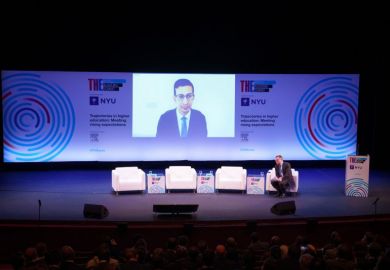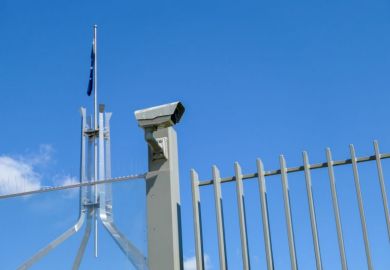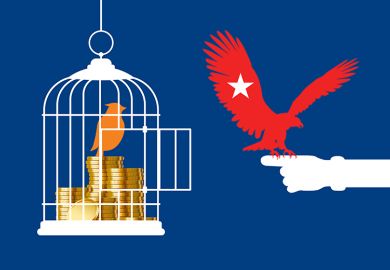It is widely agreed that innovation in teaching and research thrives on the back of diversity. Having a multitude of views and experiences makes ideas stronger and promotes progress. Overwhelming evidence shows that groups of diverse thinkers are better problem-solvers and innovators than homogeneous groups, as creativity is often enhanced by integrating different points of view.
This is exactly why academics should be deeply opposed to the proliferation of diversity, equality and inclusion (DEI) statements in US higher education.
At their most basic, these require applicants for jobs, promotions, tenure and grants to state their goals, actions and plans around DEI. But the fact is that they often go beyond reasonable expectations by using politically loaded terms and frameworks to enquire about faculty members’ own views about DEI. In effect, they force applicants to make clear and strong statements about their personal support for diversity – and the applicants know they will be monitored and assessed on how well they then exemplify these statements.
Moreover, while diversity comes in many forms, it is understood that applicants’ statements should be in line with the DEI office’s views – which often prioritise race above other considerations. As such, these statements threaten to restrict employment or advancement opportunities for scholars who dissent from the prevailing consensus on DEI-related issues of public and academic interest. In fact, these policies may even negatively impact faculty who broadly agree with their institution’s DEI values but disagree on some of the specifics, or who simply cherish the right to speak without compulsion.
Such requirements are in conflict with the fundamental values that should govern university life: intellectual freedom and epistemic humility. They compel faculty to affirm contested views on matters of public debate or to embed specific ideological perspectives in their academic activities. Departments or schools regularly take explicit positions on political matters such as American foreign policy towards Israel, the role of police in society or Black Lives Matter, and academics are expected to toe the line on pain of non-selection or dismissal. This is reminiscent of the McCarthy era and is the antithesis of a free market competition of ideas, which is the hallmark of our nation’s collegiate system.
Nor is it even likely to boost support for DEI. As Harvard law professor and co-chair of the Academic Freedom Alliance’s (AFA) academic committee Janet Halley has said: “Academics seeking employment or promotion will almost inescapably feel pressured to say things that accommodate the perceived ideological preferences of an institution demanding a diversity statement, notwithstanding the actual beliefs or commitments of those forced to speak.”
Why should any faculty member have to make a political statement to be given a grant or job? Surely no professor on the left or right could ethically and rationally support what are essentially loyalty oaths and coerced speech? And yet in a new survey by the Foundation for Individual Rights and Expression (Fire), about half of almost 1,500 professors at four-year US colleges and universities expressed the view that ideological statements are a justifiable requirement for a job at a college or university, rising to 61 per cent among female faculty. The same proportion of male faculty regarded such statements as ideological litmus tests that violate academic freedom – but 39 per cent still took the opposite view.
Non-white professors were also strongly supportive of DEI statements, as were liberal faculty. Nearly three-quarters of the latter were supportive, compared with 44 per cent of moderates and just 10 per cent of conservative faculty.
I can only assume that the danger posed to faculty, students and enquiry by DEI statements has been misunderstood by many faculty who lean to the left ideologically and have nothing but the best of intentions to make the process of learning and discovery open to all. No one wants to exclude particular groups from the benefits of education. But, as Lucas Morel, professor of politics at Washington and Lee University and another co-chair of the AFA academic committee, correctly notes: “A legitimate debate exists regarding how to promote equal access to higher education, as well as ensure a diverse intellectual community of learners. When the very terms of discussion (e.g., equality, equity, color blind, and meritocracy) are contested concepts…universities should refrain from requiring DEI statements.”
My colleagues at the American Enterprise Institute recently found that almost a fifth of academic job postings required DEI statements. It also found that elite institutions were more likely to require them. That latter fact is good news, for while these statements are too commonplace, they are not ubiquitous quite yet. This new Fire data must be a wake-up call for academics nationwide.
There is still time for faculty of all ideological persuasions to call on university administrations to reject formal diversity statements. No one should be subjected to an ideological litmus test at the expense of their academic freedom and their ability to carry out unfettered enquiry. And no one should be afraid to say so.
Samuel J. Abrams is a professor of politics at Sarah Lawrence College and a senior fellow at the American Enterprise Institute.
Register to continue
Why register?
- Registration is free and only takes a moment
- Once registered, you can read 3 articles a month
- Sign up for our newsletter
Subscribe
Or subscribe for unlimited access to:
- Unlimited access to news, views, insights & reviews
- Digital editions
- Digital access to THE’s university and college rankings analysis
Already registered or a current subscriber?








